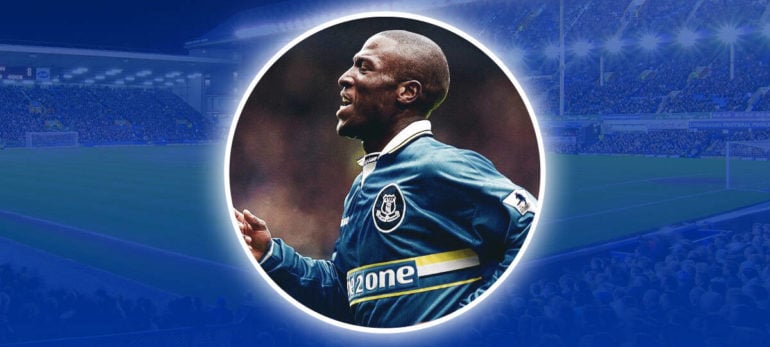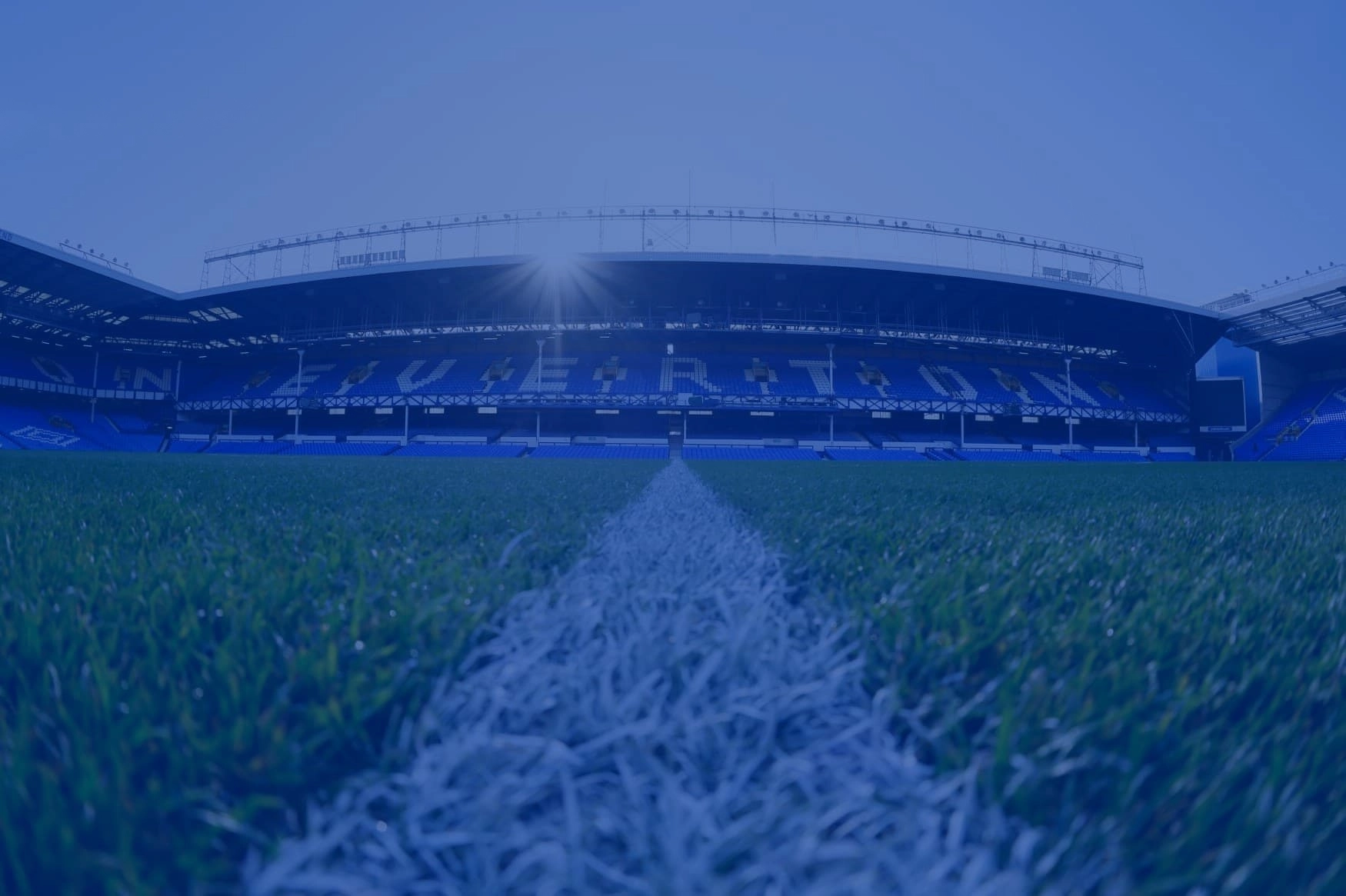20 years on- Remembering Super Kevin Campbell
The 1998/9 season was met with a sense of anticipation from Evertonians. Unlike the previous summer which had been began as farce and almost resulted in tragedy the Everton board under Chairman Peter Johnson had made good on the promise of attaining a big named manager. Following the bizarre resignation of Joe Royle in late 1997 the club had courted names such as Johann Cruyff and former player Andy Gray but had to settle for a 3rd tenure of Howard Kendall who had become a shell of the manager that had led Everton to glory a decade earlier. When Kendall was relieved of his duties following a season where we had escaped on the final day of the season by goal difference there was a collective feeling that failure to radically alter the direction of the club would now prove fatal.
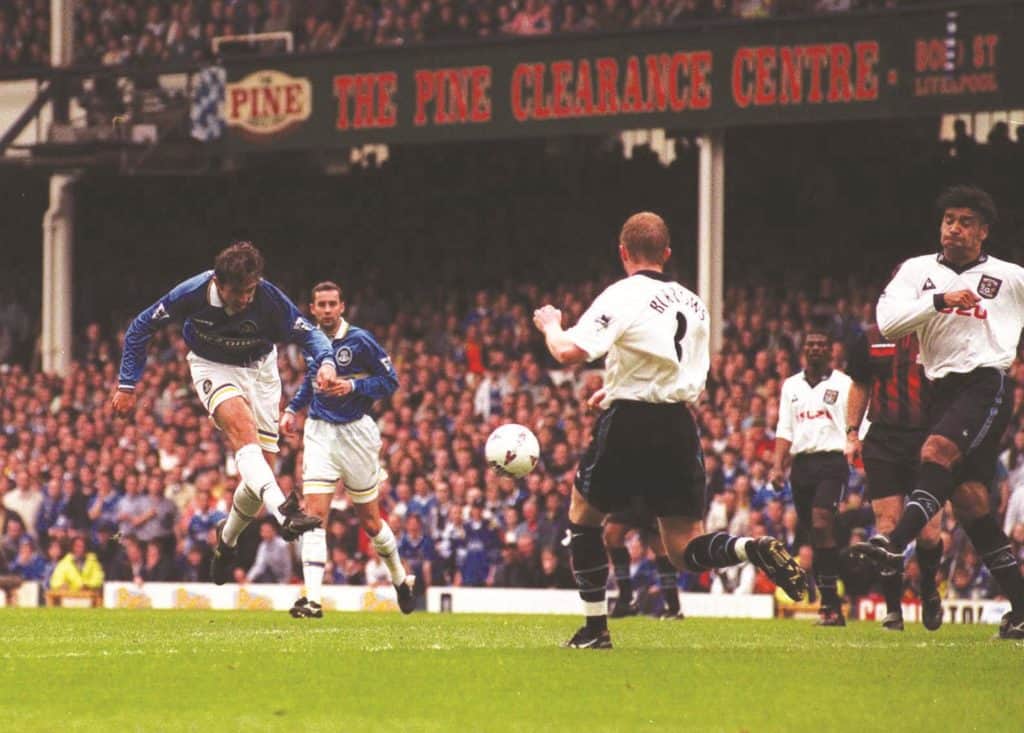
Everton had beaten off competition from Sheffield Wednesday for the appointment of Rangers manager Walter Smith, who had won multiple titles consecutively north of the border and built a strong Rangers team with players such as De Boer, Amoruso, Gattuso, Laudrop & Gasgoigne within it. The gap between Scottish and English football was much closer back then and it was something of a coup for Everton. The rangers 11 was better than Everton and they would go on to substantially outspend Everton over the next 2-3 seasons. Looking back I do wonder if Smith was given certain guarantees on his time with Everton that were not kept.
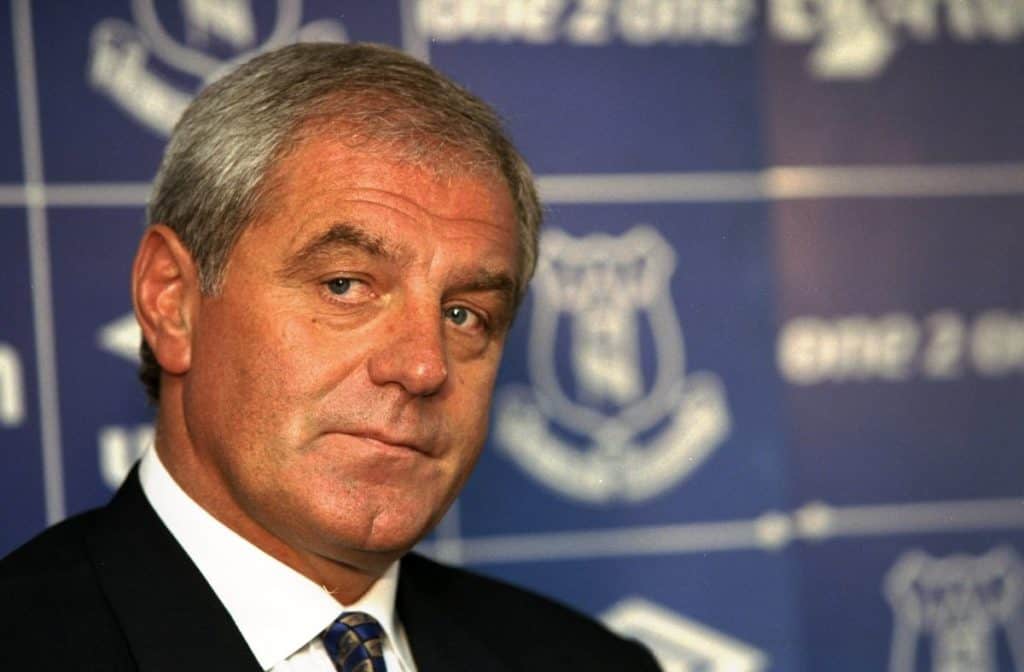
That being said, Everton too invested heavily in the summer of 1998. Young Italian Defender Marco Materazzi was brought in alongside old favourite David Unsworth, a young goalkeeper Steve Simonson was added from Tranmere while midfielders Dacourt and Collins gave Everton added quality in an area they were lacking previously. While nobody was under any illusions that a title challenge would follow, it was felt that the team was capable of finishing in the top half. Given 4 of the previous 5 seasons had seen relegation trouble, including 2 where we survived on the final day (where a single goal would have sent us down) this was viewed as worthwhile and important progress.
While optimism was high the season never really got going. John Collins missed a penalty in the opening game of the season which ended goalless and this proved a common difficulty for the team. What was sorely missing from the summer recruitment was a recognized striker to take some of the burden off Duncan Ferguson’s shoulders who was already starting to struggle with injuries. Everton would score in only 1 game in the opening 5 and 3 in the opening 10. Only 1 more was added in the next 3 games (typically Ferguson) in a 4-1 defeat and it was only thanks to Everton’s solid defence that they remained broadly competitive in the league (sitting in 17th place with 5 0-0 draws).
The problem’s heightened after this, when striker and talisman Ferguson was sold, behind the managers back. While financially the deal proved to be an astute one, the sense of betrayal felt from the fans towards chairman Johnson proved too great, who would subsequently be driven from the club. For Smith and Everton it took Everton’s best source of goals out of a side that posed very little threat. Ferguson had scored 4 of Everton’s 8 that season.
The options left to Smith were bare. He had teenage striker Danny Cadamateri (and fellow teenagers Francis Jeffers and Phil Jevons waiting in the wings) as well as under performing Nick Barmby who could play off a striker effectively. Smith had also recruited a young Ivorian striker from France Ibrahima Bakayoko for a hefty fee of £4.5 million who was already showing little aptitude to adapt to the league. If his big mistake was not recruiting a striker in the summer window, it was compounded by spending a large fee on a player who would end up scoring just 4 goals in 23 games.
In spite of these difficulties, they tread water relatively effectively until around Christmas. They went into the festive period with 22 points from 17 games which was a fair was from the hope of being a side at the top half of the league but also reflective of a side who were unlikely to be drawn into a relegation dogfight- sitting 9 clear of 18th place Blackburn.
What happened over the next 14 games was a collapse. 9 points followed from 14 games including 4 consecutive defeats during the Easter of 1999. The final defeat, at home to fellow strugglers Sheffield Wednesday (who themselves had lost 5 in a row) was particularly worrying and saw Everton slip into the relegation zone for the first time since August that season. The team was lowest in the scoring charts in the league with just 26 goals in 32 games and had scored only 16 goals in the last 14 games- 5 of which game in a somewhat freak 5-0 win against Middlesbrough. If this game was discounted Everton had scored just 16 in the previous 22 matches.
Enter Kevin Campbell. This was the context he arrived at the club in. There was a mixture of serious concern to resignation amongst the fan base about relegation, with some feeling it was now unlikely we could get ourselves out of trouble and others feeling that a run of 9 points from 14 matches left the side destined for the drop.
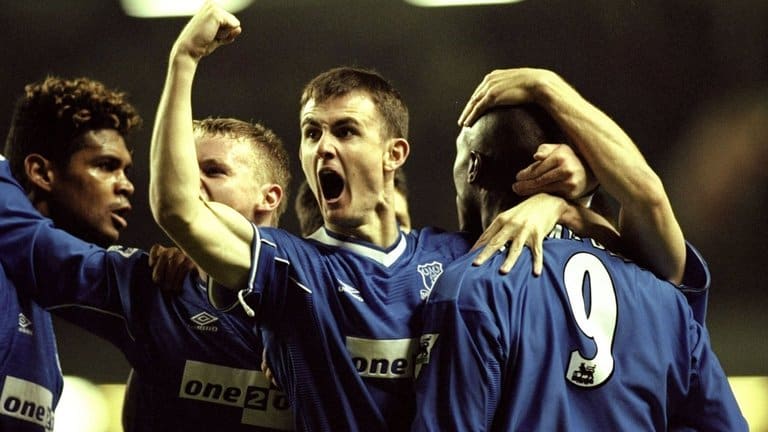
Campbell himself had endured a difficult spell in Turkey where he was subjected to alleged racial abuse from his clubs chairman and was keen on the move to Everton. Yet it is a measure of the man that when discussing his move to Everton this was not presented as the central reason for his decision. He spoke of how Everton were a big club and had a good team but lacked an experienced centre forward of the quality required to help them realize this. In all honest his own optimism and confidence would have seemed ridiculous to even the most optimistic of Evertonians who saw a team that looked a lot further away from being a competitive team than a single striker. In truth the confidence and assuredness of Kevin Campbell as well as the goals he brought was just the tonic a beleaguered club required and it didn’t take him long to evidence his own beliefs with goals on the field.
Campbell began with a brace against Coventry in a critical must win game for Everton, adding a late winning goal after Everton were reduced to 10 men for a vital 2-0 win.
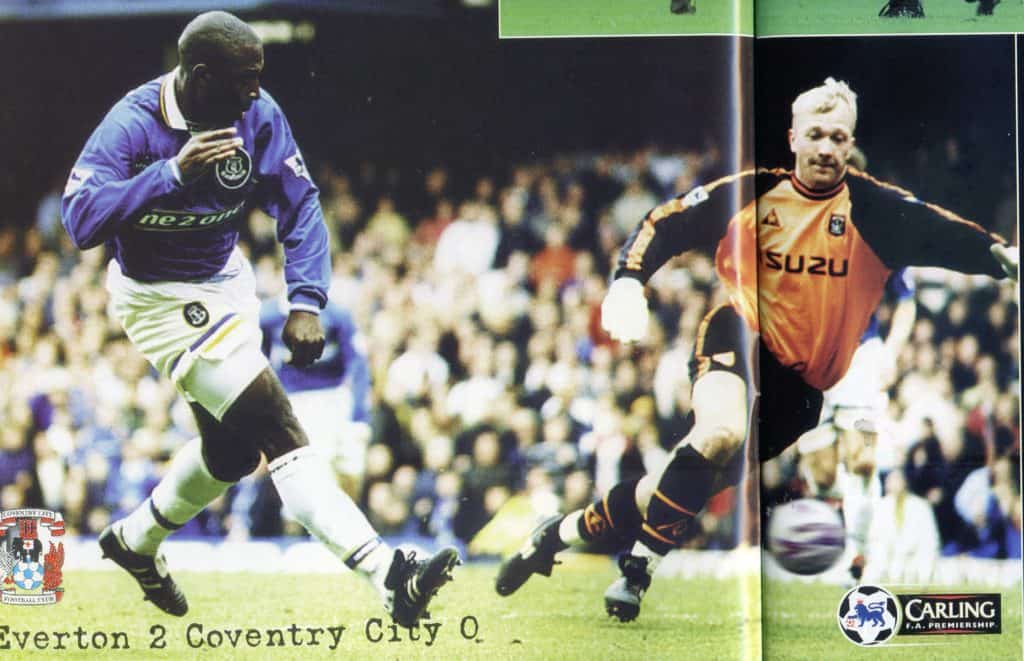
He then scored a brace for them at Newcastle in a vital 3-1 away with, another brace at home to fellow strugglers Chartlon in a 4-1 home win and a hatrick against West Ham in Everton’s biggest win of the season 6-0. He ended the season with 9 goals in 8 games and from the Coventry game 9 goals in just 6 appearances.
Those numbers above in any context are a striking set of figures for any striker just arriving at the club. I can think of no striker in my lifetime who has emulated such an immediate impact- indeed only Lineker (6 in 8) is the only player who I can think of who gets close to this record in recent times. That he produced this return in a side so bereft of attacking output before he arrived (scoring just 0.81 goals per game) and during a period of intense pressure is indicative of a the personality as well as the ability of the man. Under the highest pressure he produced a series of performances the club desperately needed.
Campbell’s own record, outside of his initial stint is relatively modest. His total of 45 league goals in 145 appearances is unlikely to rank in the top 20 of strikers to have played for the club. Yet it is what lies underneath those numbers that means that Campbell is rightly remembered by Everton supporters and the figures along don’t do that justice.
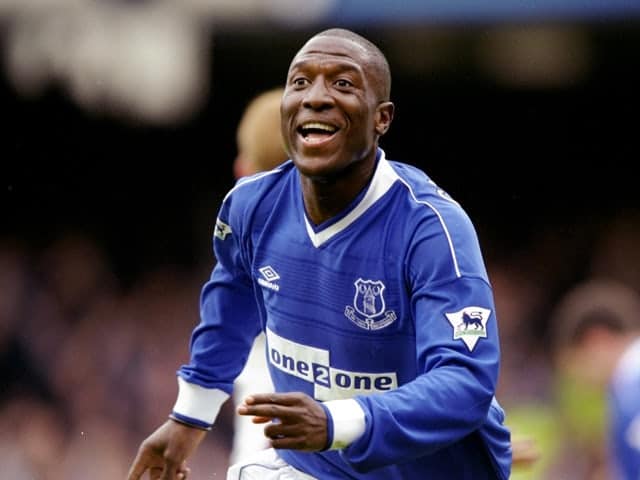
Campbell would be a central part of the Everton squad over the next 18 months that came to it’s pinnacle under Walter Smith. In the last 6 games of the 1998/9 season they would score as many goals as were scored in the previous 16. He would score 21 goals in his first 34 games for the club across the 1998/9 & 1999/2000 season (including a memorable winning goal at Anfield). The partnership he formed with Francis Jeffers was as good a strike partnership as the club had seen since the halcyon days of the 80’s where the club regularly challenged for honours. There is often much talk about why Jeffers didn’t fulfill his potential, though I do wonder how much can be put down to him not playing with a partner as intelligent and unselfish as Campbell was for him during his first spell at Everton. Campbells ability to bring others into the game, his movement off the ball and his presence and power on the pitch made other players better. An immediate partnership was struck up with Dacourt and midfield players Hutchinson and Barmby would also look better players with him in the team.
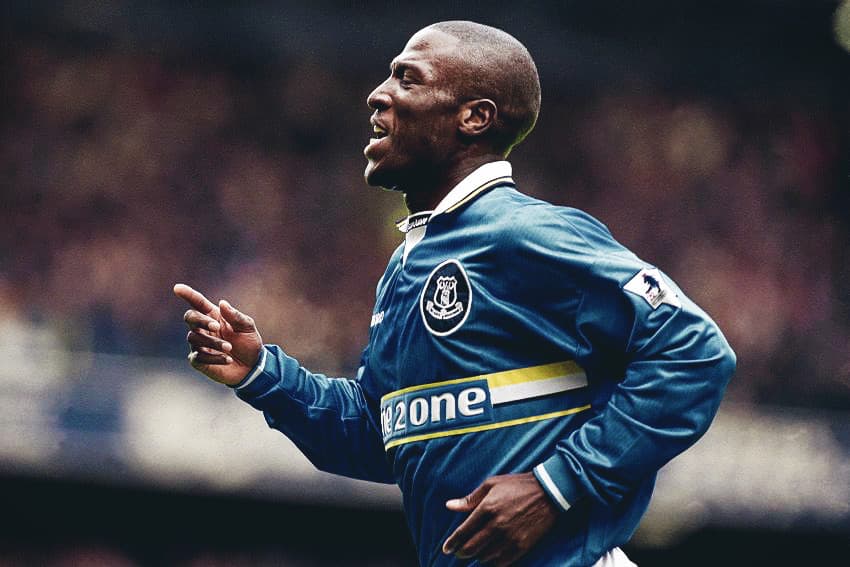
In his 2nd season at the club Everton would go on to finish on 50 points (which was lower than it ought to be due to a slow finish) and would score 59 goals in total. This has only been beaten on 5 occasions during a Premier League season- Royle 1996, Moyes 2010, Martinez 2014 & Koeman in 2016). Campbells role not just leading scorer but also target man, talisman and latterly captain was central in this. While it would be interesting to here from Campbell himself to me this was the most productive and bets period of his career and he was the complete centre forward for Everton helping them move from a club imminently heading for relegation to one secure in the middle of the table.
After the 1999-2000 season things began to unwind for Smiths Everton as they did for Campbell himself. Given his centrality to the upturn there is certainly a link between those 2 things. He scored 9 goals in 29 games in 2000-2001 and 4 in 23 in the 01-02 season. The loss of Francis Jeffers playing off him and creative players such as Hutchinson and Barmby leaving the club certainly had a detrimental affect on Campbell. You could also see how age and injuries were beginning to catch up with Campbell, who had been signed at 29 yet had turned 33 by the time Smiths regime was in it’s last embers. Campbell remained a committed and intelligent target man but the pace left his game and so too did his ability to turn defenders and get on the end of through balls. This is no slight on Campbell who had provided the club with ample value during his time but an acknowledgement of how unfortunate it was the club couldn’t have signed Campbell a few years earlier when he was in his prime.
Perhaps the final acknowledgement that can be paid to Campbell though is that the 2002 season was not his final season with the club. When new manger Moyes came to the club he was keen to lower the playing age of the squad, play at a higher intensity and introduce more speed into the attacking play. Given Campbells age and declining record of goals he would have been deemed an obvious choice to be moved on. Moyes would even choice the talismatic Ferguson to be his first choice centre forward and made him captain- and Ferguson would enjoy a brief goalscoring return to form with some crucial goals at the back end of that season (as Campbell had done in 1999 albeit in more explosive fashion). Not only would it have been easy for Moyes to have moved Campbell on, it would have been easy for Campbell to feel slighted and look to move on himself (or allow his performance levels to drop).
It is testament the creativity and flexibility of Moyes that he did not do this and saw potential in Campbell, but greater testament to the professionalism and character of Campbell that neither of those things occurred. Campbell won his place back, playing exclusively as a target man and would return 12 goals in 39 games (in all competitions) as Everton’s number 9. He would also strike a fruitful partnership with young protégé Wayne Rooney but also help Tomasz Radzinski enjoy his best performance in English football in much the same way he did for Francis Jeffers.
While many of Campbells physical attributes had declined what differentiated Campbell was his mental strength and intelligence. Both on the field he would position himself astutely and provide a good pivot for other players to build attacks from. More broadly though Campbell was (and remains) an incredibly articulate ambassador for Everton Football Club and he must have been a joy for both Moyes and Smith to have in his dressing room. He had the foresight to see an opportunity 20 years ago that few of us knew was there and a confidence in his own ability to deliver on that stage.
Arguably the biggest compliment that can be made to Campbell is not only that he rescued the club with a remarkable period of good form or that he helped improve many different players around him but that the team itself performed at a higher level when he was in it. In his first full season we achieve 1.5 points per game (ppg) with him in the team against 0.91 without him. In 2000-01 season it was 1.21 ppg with and 0.77 without him and in 2001-02 it was 1.22 with him and 1 without him.
While raw statistics show that he doesn’t stack up up favourably to the likes of Dean, Lawton, Parker, Chadwick, Southworth, Latchford, Grey or Sharp the underlying stats indicate a significant impact in a different way. Very few of Everton’s great strikers went into a side as bereft of goals and direction of Campbell and would have displayed such a sharp differential in terms of how a team performed with or without them. The numbers indicate that any progress shown under Smith was very centrally down to him, and without him in the team they remained the side he joined-notably one spiraling towards relegation. It was not just the remarkable scoring blitz of 1999 that should live in our memories (though it is his most striking contribution) but the following 5 seasons where he topped the clubs scoring charts on 4 occasions and steered us away from the relegation zone.
He would leave the club in 2005 with the club sitting in the top 4 (where it finished). Moyes was eventually remodeling the team to look like the one he initially wanted to build and slowly acquiring the younger, fitter players he was after. The now 30 something he inherited (primarily Stubbs, Weir, Campbell & Ferguson) would slowly be eased out to make way for this process but not before they had allowed him to build the foundations for a club not to be perennial relegation candidates. Campbell would join West Brom in January who would become the first club in Premier League history not to be relegated following being bottom on Christmas day. For eagle eyed Evertonians it would come as no surprise the impact Campbell would have and it is no coincidence that the role he would have not just on the field but in the dressing room would be hugely influential in this transformation.
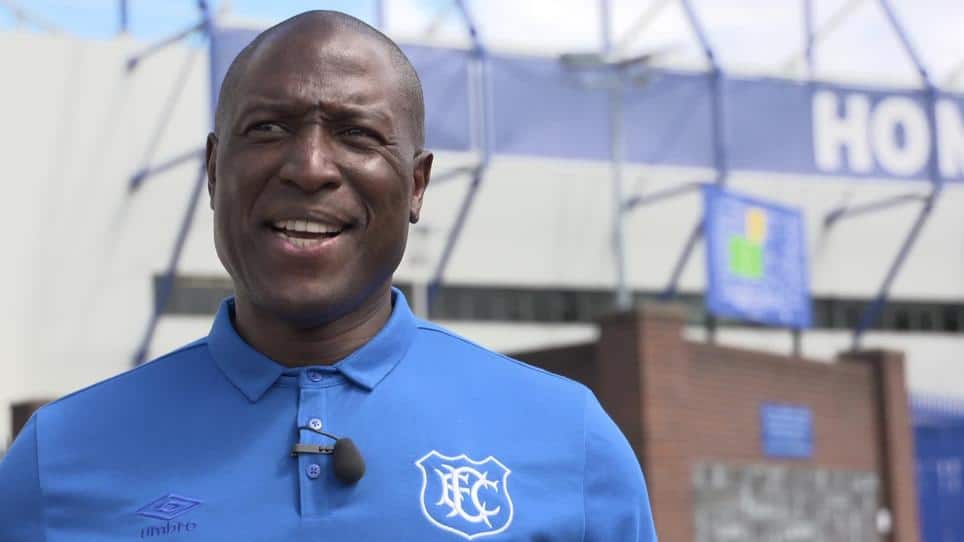
So as the 20 year anniversary of Kevin Campbells first joining the club as well as his first goals approach it seems an opportune moment to put on record the thanks of Evertonian’s for the role he had in saving the club from impending relegation. He rightly considers himself an Evertonian and I am sure if he ever visits Liverpool he will never be short of offers to buy him a drink. Now all together- who put the ball in the redshite net?


